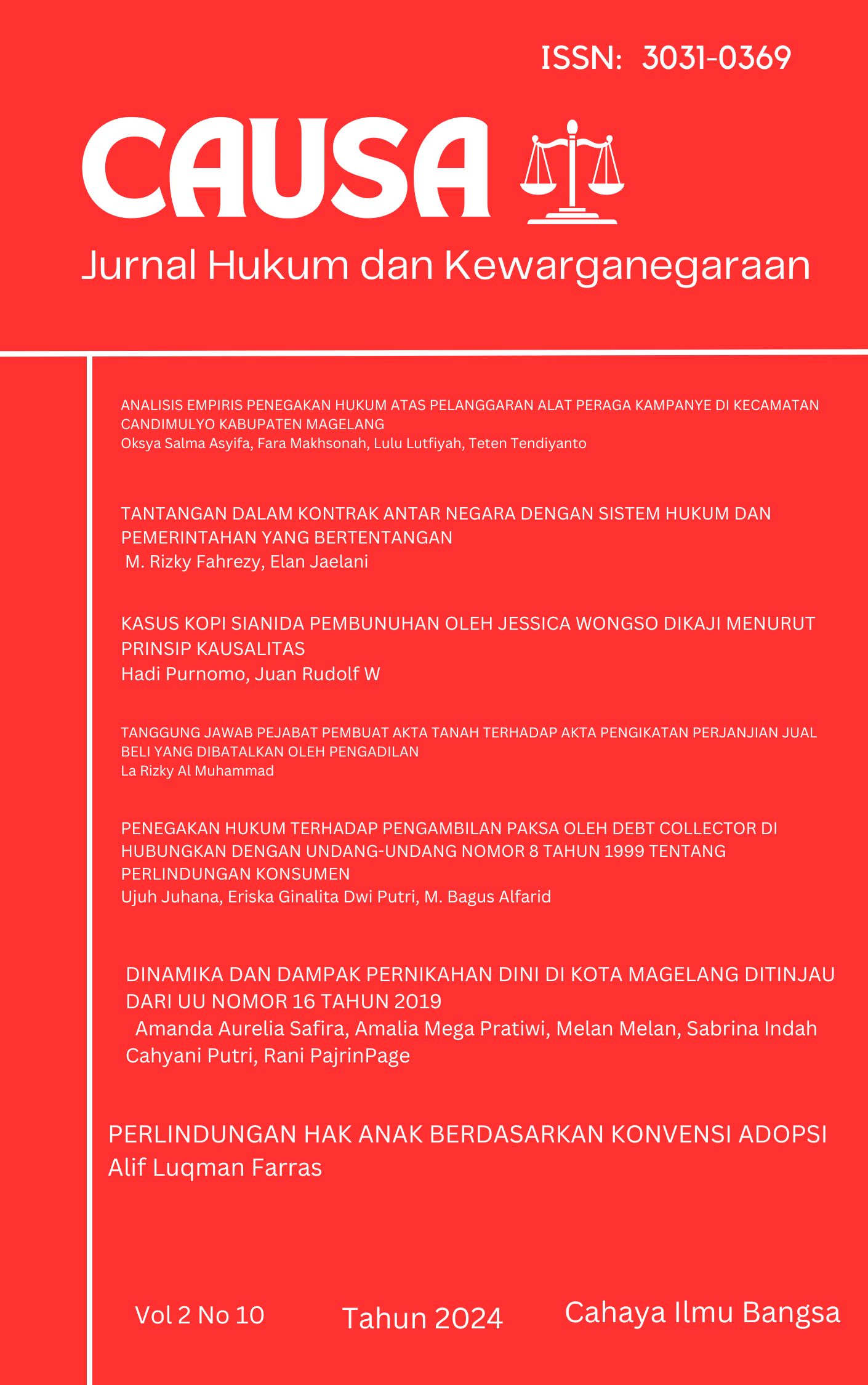TRANSFORMASI DELIK PENCEMARAN NAMA BAIK DALAM ERA DIGITAL: RELEVANSI UU ITE PASCA PERUBAHAN KEDUA
- Authors
-
-
Putri Ramadhani Rangkuty
Universitas Islam Negeri Sumatera UtaraAuthor -
Arsyad Rizky Pratama Siregar
Universitas Islam Negeri Sumatera UtaraAuthor
-
- Keywords:
- Electronic Information and Transactions Law (UU ITE), defamation, freedom of expression, digital era, legal transformation
- Abstract
-
The development of information and communication technology has significantly transformed patterns of social interaction, particularly through social media and digital platforms. Within this context, the defamation offense regulated under the Electronic Information and Transactions Law (UU ITE) has become a controversial issue, as it is often perceived to potentially suppress freedom of expression. This study aims to analyze the transformation of defamation offenses in the digital era and assess the relevance of UU ITE articles following the second amendment through Law No. 1 of 2024. Using a normative-juridical approach and qualitative analysis of regulations, legal documents, and court decisions, this research finds that the revision of UU ITE has narrowed the scope for multiple interpretations by removing the element of “insult” and clarifying the legal subject. Although normatively improved, the implementation of these provisions in practice still faces challenges, such as inconsistent understanding among law enforcement officers and the lack of digital legal literacy among the public. Therefore, the relevance and effectiveness of these provisions heavily depend on fair law enforcement, public legal education, and the establishment of implementing regulations that uphold human rights protection and freedom of expression in the digital age.
- Downloads
- Published
- 2025-06-21
- Section
- Articles
How to Cite
Most read articles by the same author(s)
- Putri Ramadhani Rangkuty, Dinda Ayu Arini Chaniago, Fitria Muchtar Siregar, Irham Mahromy Munthe, Irpan Mauliandi Damanik, Nia Amelia Suhada Dalimunthe, Rahman Al-Fauzi Siregar, ASPEK KRIMINOLOGI HUKUM DALAM KEJAHATAN DIGITAL REMAJA: STUDI UU ITE DAN FAKTOR SOSIAL , Causa: Jurnal Hukum dan Kewarganegaraan: Vol. 13 No. 11 (2025): Causa: Jurnal Hukum dan Kewarganegaraan
Similar Articles
- Putri Sofiani Danial, Trubus Rahardiansyah, PRAKTIK PENAGIHAN ABUSIF OLEH PINJAMAN ONLINE ILEGAL: KETIMPANGAN AKSES KEADILAN DAN PERLINDUNGAN KONSUMEN DI INDONESIA , Causa: Jurnal Hukum dan Kewarganegaraan: Vol. 15 No. 1 (2025): Causa: Jurnal Hukum dan Kewarganegaraan
- Amalia Fakhrana Suhandy, Dhiya Ulhaq, Dayandra Suspita Putri, Eva Savariah, ikhwan Aulia Fatahillah, HAK CIPTA DI LAYAR GELAP: TINJAUAN HUKUM ATAS AKSES ILEGAL FILM MELALUI SITUS STREAMING BAJAKAN , Causa: Jurnal Hukum dan Kewarganegaraan: Vol. 14 No. 7 (2025): Causa: Jurnal Hukum dan Kewarganegaraan
- Johan Amanda Maliku, Taun Taun, ANTARA HOAKS DAN UJARAN KEBENCIAN : KESENJANGAN PENEGAKAN HUKUM PIDANA DI ERA DISINFORMASI DIGITAL , Causa: Jurnal Hukum dan Kewarganegaraan: Vol. 12 No. 12 (2025): Causa: Jurnal Hukum dan Kewarganegaraan
- Alwi Suhaya, Qeysha Ayle Viorella, Salsabila, URGENSI UU PERLINDUNGAN DATA PRIBADI: TANGGUNG JAWAB HUKUM KEBOCORAN DATA PEDULILINDUNGI , Causa: Jurnal Hukum dan Kewarganegaraan: Vol. 14 No. 9 (2025): Causa: Jurnal Hukum dan Kewarganegaraan
- Fhadhilatul Fhatihah, Nadila Nuraini, Lunneta Ardelia Isywal, EFEKTIVITAS PENEGAKAN HUKUM TERHADAP TINDAK PIDANA JUDI OLNLINE DALAM PERSPEKTIF UU ITE DAN KUHP , Causa: Jurnal Hukum dan Kewarganegaraan: Vol. 13 No. 5 (2025): Causa: Jurnal Hukum dan Kewarganegaraan
- Najwa Melfia Maharani, Emilia Susanti, Deni Achmad, Firganefi, POLITIK HUKUM PIDANA DALAM PENANGGULANGAN TINDAK PIDANA PEMERASAN BERMUATAN SEKSUAL (SEXTORTION) MELALUI MEDIA SOSIAL , Causa: Jurnal Hukum dan Kewarganegaraan: Vol. 15 No. 8 (2025): Causa: Jurnal Hukum dan Kewarganegaraan
- Frencky Maralop, Henny Nuraeny, Sudiman Sihotang, FUNGSIONALISASI BARANG BUKTI DIGITAL YANG DIPEROLEH MELALUI DIGITAL FORENSIK DALAM PERSPEKTIF PEMBUKTIAN PERKARA PIDANA KEJAHATAN BISNIS , Causa: Jurnal Hukum dan Kewarganegaraan: Vol. 15 No. 2 (2025): Causa: Jurnal Hukum dan Kewarganegaraan
- Salwa Rahmah Asysyifa Prasad, IMPLIKASI HUKUM BAGI PERLINDUNGAN KONSUMEN DALAM TRANSAKSI PENIPUAN ONLINE , Causa: Jurnal Hukum dan Kewarganegaraan: Vol. 15 No. 7 (2025): Causa: Jurnal Hukum dan Kewarganegaraan
- Muhamad Fadilah Kurniawan, Eltsaabita Ronaa Eftria, Dian Eka Prastiwi, MENJAGA PRIVASI DI ERA DIGITAL PERLINDUNGAN HUKUM TERHADAP DATA PRIBADI DI INDONESIA , Causa: Jurnal Hukum dan Kewarganegaraan: Vol. 14 No. 10 (2025): Causa: Jurnal Hukum dan Kewarganegaraan
- Maria Nursiana Lalian, Elsiana Boe Dao, RATIO DECI DENDI TERHADAP PELAKU TINDAK PIDANA PEMERASAN DAN/ATAU PENGANCAMAN OLEH PENAGIH PINJAMAN ONLINE ILEGAL MELALUI WHATSAPP DI TINJAU BERDASARKAN UNDANG-UNDANG INFORMASI DAN TRANSAKSI ELEKTRONIK NOMOR 19 TAHUN 2016 (Analisis Putusan Nomor 438/Pid.Sus/2020/PN Jkt.Utr) , Causa: Jurnal Hukum dan Kewarganegaraan: Vol. 14 No. 11 (2025): Causa: Jurnal Hukum dan Kewarganegaraan
You may also start an advanced similarity search for this article.

